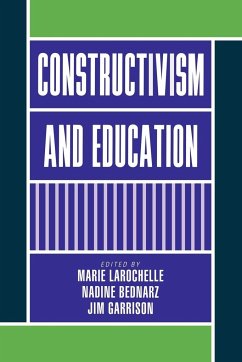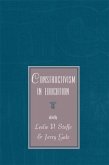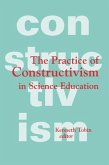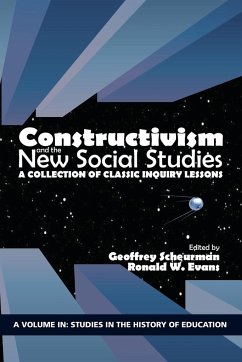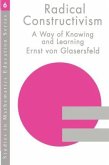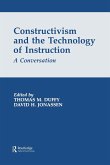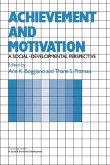Constructivism and Education
Herausgeber: Larochelle, Marie; Garrison, Jim; Bednarz, Nadine
Constructivism and Education
Herausgeber: Larochelle, Marie; Garrison, Jim; Bednarz, Nadine
- Broschiertes Buch
- Merkliste
- Auf die Merkliste
- Bewerten Bewerten
- Teilen
- Produkt teilen
- Produkterinnerung
- Produkterinnerung
An international collection dealing with the constructivist approach to education.
Andere Kunden interessierten sich auch für
![Constructivism in Education Constructivism in Education]() Constructivism in Education115,99 €
Constructivism in Education115,99 €![The Practice of Constructivism in Science Education The Practice of Constructivism in Science Education]() The Practice of Constructivism in Science Education64,99 €
The Practice of Constructivism in Science Education64,99 €![Constructivism and the New Social Studies Constructivism and the New Social Studies]() Constructivism and the New Social Studies73,99 €
Constructivism and the New Social Studies73,99 €![RADICAL CONSTRUCTIVISM RADICAL CONSTRUCTIVISM]() Ernst Von GlasersfeldRADICAL CONSTRUCTIVISM61,99 €
Ernst Von GlasersfeldRADICAL CONSTRUCTIVISM61,99 €![Constructivism and the Technology of Instruction Constructivism and the Technology of Instruction]() Constructivism and the Technology of Instruction64,99 €
Constructivism and the Technology of Instruction64,99 €![Understanding and Preventing Teacher Burnout Understanding and Preventing Teacher Burnout]() Roland Vandenberghe / A. Michael Huberman (eds.)Understanding and Preventing Teacher Burnout51,99 €
Roland Vandenberghe / A. Michael Huberman (eds.)Understanding and Preventing Teacher Burnout51,99 €![Achievement and Motivation Achievement and Motivation]() Achievement and Motivation50,99 €
Achievement and Motivation50,99 €-
-
-
An international collection dealing with the constructivist approach to education.
Produktdetails
- Produktdetails
- Verlag: Cambridge University Press
- Seitenzahl: 320
- Erscheinungstermin: 31. Dezember 2008
- Englisch
- Abmessung: 229mm x 152mm x 19mm
- Gewicht: 522g
- ISBN-13: 9780521109604
- ISBN-10: 0521109604
- Artikelnr.: 26033945
- Herstellerkennzeichnung
- Libri GmbH
- Europaallee 1
- 36244 Bad Hersfeld
- gpsr@libri.de
- Verlag: Cambridge University Press
- Seitenzahl: 320
- Erscheinungstermin: 31. Dezember 2008
- Englisch
- Abmessung: 229mm x 152mm x 19mm
- Gewicht: 522g
- ISBN-13: 9780521109604
- ISBN-10: 0521109604
- Artikelnr.: 26033945
- Herstellerkennzeichnung
- Libri GmbH
- Europaallee 1
- 36244 Bad Hersfeld
- gpsr@libri.de
Part I. Introduction: 1. Constructivism and education: beyond
epistemological correctness Marie Larochelle and Madine Bednarz; Part
II. From Epistemological Constructivism to Teaching: A Variety of Views: 2.
Why constructivism must be radical Ernst von Glaserfeld; 3. An epistemology
for didactics: speculations on situating a concept Albert Morf; 4. Toward a
pragmatic social constructivism Jim Garrison; Part III. Teaching Within the
Constructivist Mode: Practices and Promises: 5. Individual construction,
mathematical acculturation, and the classroom community Paul Cobb, Marcela
Perlwitz and Diana Underwood-Gregg; 6. The construction of answers to
insoluble problems Maria-Luisa Schubauer-Leoni and Ladislas Ntamakiliro; 7.
Voice and perspective: hearing epistemological innovation in students'
words Jere Confrey; 8. Constructivism-in-action: students examine their
idea of science Jacques Désautels; 9. Constructivism and ethical
justification Gérard Fourez; 10. Social studies, trivial constructivism,
and the politics of social knowledge Stephen C. Fleury; 11. Practical
knowledge and school knowledge: a constructivist representation of
education Yvon Pépin; Part IV. The Mediating role of Teachers and Teacher
Education: 12. Sociocultural perspectives on the teaching and learning of
science Kenneth Tobin; 13. Remarks on the education of elementary teachers
Heinrich Bauersfeld; 14. Constructivism as a referent for reforming scinece
education Michael L. Bentley; Part V. Conclusion: 15.
Critical-constructivism and the sociopolitical agenda Jacques Désautels,
Jim Garrison and Stephen C. Fleury; Notes; References; Index.
epistemological correctness Marie Larochelle and Madine Bednarz; Part
II. From Epistemological Constructivism to Teaching: A Variety of Views: 2.
Why constructivism must be radical Ernst von Glaserfeld; 3. An epistemology
for didactics: speculations on situating a concept Albert Morf; 4. Toward a
pragmatic social constructivism Jim Garrison; Part III. Teaching Within the
Constructivist Mode: Practices and Promises: 5. Individual construction,
mathematical acculturation, and the classroom community Paul Cobb, Marcela
Perlwitz and Diana Underwood-Gregg; 6. The construction of answers to
insoluble problems Maria-Luisa Schubauer-Leoni and Ladislas Ntamakiliro; 7.
Voice and perspective: hearing epistemological innovation in students'
words Jere Confrey; 8. Constructivism-in-action: students examine their
idea of science Jacques Désautels; 9. Constructivism and ethical
justification Gérard Fourez; 10. Social studies, trivial constructivism,
and the politics of social knowledge Stephen C. Fleury; 11. Practical
knowledge and school knowledge: a constructivist representation of
education Yvon Pépin; Part IV. The Mediating role of Teachers and Teacher
Education: 12. Sociocultural perspectives on the teaching and learning of
science Kenneth Tobin; 13. Remarks on the education of elementary teachers
Heinrich Bauersfeld; 14. Constructivism as a referent for reforming scinece
education Michael L. Bentley; Part V. Conclusion: 15.
Critical-constructivism and the sociopolitical agenda Jacques Désautels,
Jim Garrison and Stephen C. Fleury; Notes; References; Index.
Part I. Introduction: 1. Constructivism and education: beyond
epistemological correctness Marie Larochelle and Madine Bednarz; Part
II. From Epistemological Constructivism to Teaching: A Variety of Views: 2.
Why constructivism must be radical Ernst von Glaserfeld; 3. An epistemology
for didactics: speculations on situating a concept Albert Morf; 4. Toward a
pragmatic social constructivism Jim Garrison; Part III. Teaching Within the
Constructivist Mode: Practices and Promises: 5. Individual construction,
mathematical acculturation, and the classroom community Paul Cobb, Marcela
Perlwitz and Diana Underwood-Gregg; 6. The construction of answers to
insoluble problems Maria-Luisa Schubauer-Leoni and Ladislas Ntamakiliro; 7.
Voice and perspective: hearing epistemological innovation in students'
words Jere Confrey; 8. Constructivism-in-action: students examine their
idea of science Jacques Désautels; 9. Constructivism and ethical
justification Gérard Fourez; 10. Social studies, trivial constructivism,
and the politics of social knowledge Stephen C. Fleury; 11. Practical
knowledge and school knowledge: a constructivist representation of
education Yvon Pépin; Part IV. The Mediating role of Teachers and Teacher
Education: 12. Sociocultural perspectives on the teaching and learning of
science Kenneth Tobin; 13. Remarks on the education of elementary teachers
Heinrich Bauersfeld; 14. Constructivism as a referent for reforming scinece
education Michael L. Bentley; Part V. Conclusion: 15.
Critical-constructivism and the sociopolitical agenda Jacques Désautels,
Jim Garrison and Stephen C. Fleury; Notes; References; Index.
epistemological correctness Marie Larochelle and Madine Bednarz; Part
II. From Epistemological Constructivism to Teaching: A Variety of Views: 2.
Why constructivism must be radical Ernst von Glaserfeld; 3. An epistemology
for didactics: speculations on situating a concept Albert Morf; 4. Toward a
pragmatic social constructivism Jim Garrison; Part III. Teaching Within the
Constructivist Mode: Practices and Promises: 5. Individual construction,
mathematical acculturation, and the classroom community Paul Cobb, Marcela
Perlwitz and Diana Underwood-Gregg; 6. The construction of answers to
insoluble problems Maria-Luisa Schubauer-Leoni and Ladislas Ntamakiliro; 7.
Voice and perspective: hearing epistemological innovation in students'
words Jere Confrey; 8. Constructivism-in-action: students examine their
idea of science Jacques Désautels; 9. Constructivism and ethical
justification Gérard Fourez; 10. Social studies, trivial constructivism,
and the politics of social knowledge Stephen C. Fleury; 11. Practical
knowledge and school knowledge: a constructivist representation of
education Yvon Pépin; Part IV. The Mediating role of Teachers and Teacher
Education: 12. Sociocultural perspectives on the teaching and learning of
science Kenneth Tobin; 13. Remarks on the education of elementary teachers
Heinrich Bauersfeld; 14. Constructivism as a referent for reforming scinece
education Michael L. Bentley; Part V. Conclusion: 15.
Critical-constructivism and the sociopolitical agenda Jacques Désautels,
Jim Garrison and Stephen C. Fleury; Notes; References; Index.

